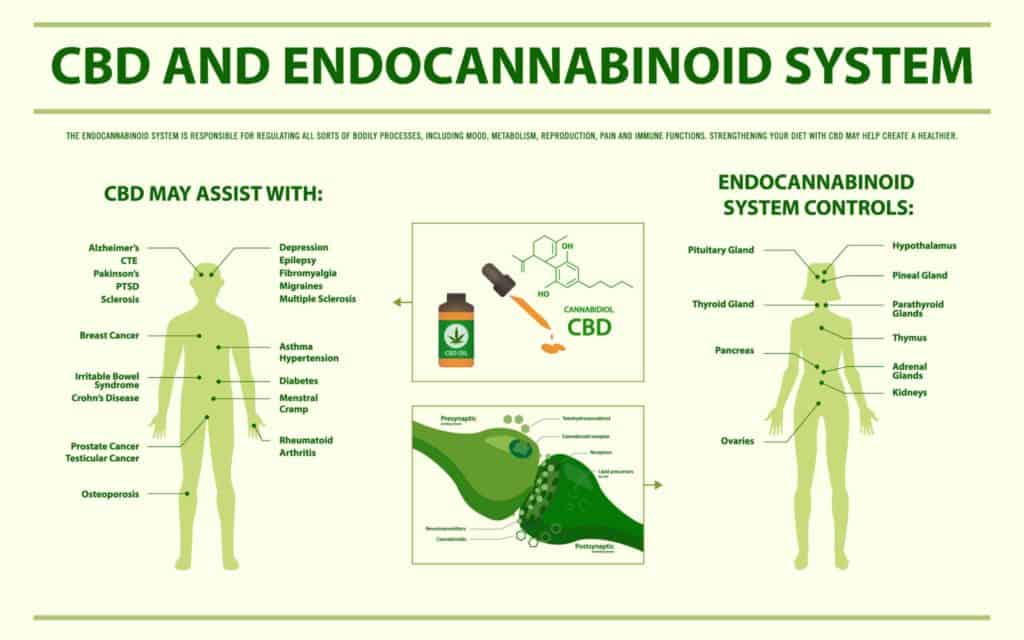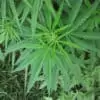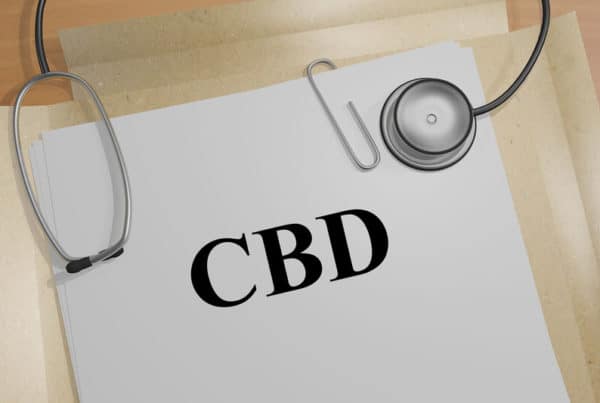TABLE OF CONTENTS
Cannabidiol, known as CBD, has grown in popularity worldwide. Cannabidiol is an extract of the cannabis plant. The therapeutic properties of CBD are abundant.
It is a wildly studied compound. Many studies have been conducted in hopes to discover the many different ways that we can use CBD.
The U.S. Food and Drug Administration (FDA) approved the use of Epidiolex (purified CBD oil) in 2018 for treating epilepsy.
This article will shine light on what CBD's benefits and answer questions of how CBD works in the body.
Understanding CBD
There are over 150 cannabinoids found in cannabis. The most common are tetrahydrocannabinol (THC) and cannabidiol (CBD).
THC is the compound responsible for the ‘high' associated with cannabis. CBD, on the other hand, isn't psychoactive and will not make you high.
Instead, CBD exhibits other beneficial properties, such as reducing inflammation and pain, treating epilepsy and seizures, and treating migraines and allergies.
How Does CBD Work in the Body?
Like all cannabinoids, CBD produces effects in the body by interacting with cannabinoid receptors.
These receptors are part of the endocannabinoid system.
The body produces two receptors that interact with CBD, the CB1 and CB2 receptors.
While THC will attach to the CB1 receptor, CBD stimulates the receptors, making the body produce endocannabinoids.
Endocannabinoids are similar to cannabinoids but are produced in the body. The endocannabinoid system is composed mainly of these endogenous cannabinoids.
- CB1 receptors are present in the brain or central nervous system and every other part of the body. Their primary function is to coordinate movement, the sensation of pain, memories, emotion, mood, appetite, sleep, and other functions.
- CB2 receptors, on the other hand, are more commonly found in the peripheral nervous system. They're involved in reducing inflammation and pain in the body.
CBD and the Endocannabinoid System

Discovered in the 1990s, the endocannabinoid system is a complex biological system that regulates many internal processes such as appetite, sleep, mood, memory, etc.
Researchers believe there is more to be known about the endocannabinoid system.
Various components of the endocannabinoid system function to keep the body running smoothly.
The presence of CBD causes the endocannabinoids to bind to the receptors. Endocannabinoids bind to either of the two types of receptors discussed above.
The resultant effects depend on the location of the receptor that the endocannabinoid binds to.
According to research, when CBD enters the body, it is broken down by the endocannabinoid system's enzymes. This action activates the endocannabinoids to bind to receptors.
It is believed that CBD does not bind directly to the receptors but influences the binding of the endocannabinoids to receptors.
In essence, it is the activation and binding of these receptors to endocannabinoids that actually produces the many health benefits people have come to associate with CBD.
Benefits of CBD
Here are some common benefits of CBD in the body.
Pain and Inflammation
Several studies reveal that CBD has anti-inflammatory properties and can be used as a natural source for treating chronic pain.
Epilepsy
The FDA in 2018 finally approved the use of Epidiolex, a purified form of CBD for treating two types of epilepsy (Lennox-Gastaut syndrome and Dravet syndrome) in people over the age of 3.
These types of epilepsy are characterized by seizures that are quite difficult to control with other kinds of medication.
So far, scientists have shown that CBD can target the endocannabinoid system in a way that most synthetic drugs can't.
Cancer
Studies show that CBD suppresses the growth of cancer cells. Some researchers have even suggested including CBD in chemotherapy for certain types of cancer.
However, there's a need for more research to understand how CBD combats cancer in the body and how it can be better used.
Anxiety
While medical experts advise that people with chronic anxiety avoid cannabis, they recommend CBD as a substance that can help reduce anxiety.
It's often used by people with conditions such as PTSD, social anxiety disorder, obsessive-compulsive disorder, and general anxiety disorder (GAD).
Acne
CBD is becoming increasingly popular in cream and skin ointments.
When applied topically, CBD oil serves as an effective remedy for several skin conditions, including acne and rashes.
Other medicinal applications of CBD:
- Parkinson's disease
- Alzheimer's disease
- Allergies
- Migraines
Legality of CBD
The 2018 Farm Bill legalized the cultivation and sale of industrial hemp and its extracts, including CBD, at the federal level, as long as the hemp contains less than 0.3% THC. This effectively removed hemp-derived CBD from the list of controlled substances.
CBD can be illegal under some state laws. For this reason, it is advisable to check local laws on the use of CBD, especially when you travel.
Can CBD Oil Make You Feel High?
Unlike THC, CBD does not produce intoxicating effects. For this reason, many users turn to CBD for its symptomatic relief from pain, anxiety, and other symptoms without the “high” of cannabis and the side effects of THC.
Everyone experiences CBD differently. Some users may not notice the effects even after a few months of regular CBD oil use. Regardless of how you use it, CBD oil should not make you feel intoxicated. Instead, it should elicit relaxing and calming effects.
The effects of CBD oil will depend on your dosage, strain, ingredients, and production method. Other factors that will affect the effects of CBD products include your metabolism, diet, genetics, medical conditions, and medications.
Using CBD For Skin Care
There are many CBD benefits that can be attributed to the marijuana plant. One of the benefits of CBD is skin care.
When using CBD to make a skin care product, it is a more natural way to treat the skin.
CBD benefits those who want to treat a wide range of skin conditions such as atopic dermatitis, psoriasis and acne.
The Healing Properties of using CBD in Skin Care
With its anti-inflammatory and therapeutic properties, CBD is one of the best things to add to skin care products. It works as an antioxidant, helping to soothe and treat painful acne, irritated skin and as a stimulant to cell rejuvenation to help skin look youthful and healthy.
The Immune Response
Like other cannabinoids, CBD benefits those seeking a product with immunosuppressive elements. This means that the immune response is suppressed; partially or wholly. CBD works from the inside of the skin to the outer area of the skin. This is helpful to people who suffer from severe skin conditions such as Psoriasis.
CBD oil is helpful in improving dry skin, protecting the skin against ultra violet rays, and slowing down the aging process.
Using CBD For Nerve Pain
Cannabidiol (CBD) has shown to provide tremendous relief for a number of medical conditions and symptoms. However, studies into the effects of CBD on nerve pain are limited.
In general, the limited amount of studies on CBD and pain have shown that CBD can help reduce inflammation. In addition, CBD helps lower the buildup of immune cells in spinal fluid. Lower inflammation and immune cells may lead to a reduction in pain.
Nerve pain, also known as neuropathy, doesn’t work the same as other types of pain including inflammatory and central pain. Nerve pain affects the body's nervous system. Patients may feel stinging, burning, or shooting pain in the affected area or throughout the body.
CBD for nerve pain studies have not determined the exact effects of CBD. However, the research shows promise. CBD’s high chance of efficacy and low risk for side effects makes it a worthwhile alternative to traditional pain relievers and opioids.
Using CBD For Arthritis
If you suffer from pain you may find some positive results from using CBD for arthritis.
Arthritis is any joint disorder that involves the inflammation of one or more joints. Arthritis affects millions of adults throughout the U.S. In fact, the Arthritis Foundation estimates that 54.4 million adults in the U.S. have doctor-diagnosed arthritis. Some experts suggest this umbrella term for joint pain and diseases is exceeding epidemic proportions.
Over time, our joints can fall prey to overuse or disease. Symptoms can include pain, stiffness, swelling, redness, and a limited range of motion.
CBD as a Complementary Treatment Option for Arthritis
Treatment for arthritis varies based on type, but can include joint injections or surgery to alleviate the painful symptoms. Medication may also be used to dull the pain.
These treatments can come with a host of severe side effects. Many patients who have found limited relief with traditional treatment or want to limit their medication dosage turn to medical cannabis.
Many arthritis patients have proclaimed their adoration for this newly available medicinal product.
Arthritis patients should consult with a doctor before introducing CBD into their treatment regimen. For new users, it’s important to start off with the lowest dose of CBD possible to gauge its effects on pain and inflammation. If larger doses are needed, patients can gradually and slowly increase the dosage to achieve their desired results.
CBD’s effects depend on the type of arthritis the person has, the person’s genetics, the quality of CBD, the mode of administration, and the medical interactions between CBD and other medications.
Many new users start off with 5 mg or less of CBD once or twice a day. Some users, especially those with rheumatoid arthritis, might need as much as 100 mg of CBD. Stronger pain relief may be achieved with a product containing THC also.
Smoking and vaping CBD can provide fast-acting effects. Edible take about an hour to take effect but can last longer than most delivery methods. Topicals and transdermals act locally on joint pain that is flaring up.
Make sure to get CBD that has been lab-tested for purity and potency.
Before taking CBD or choosing a specific brand of products, do diligent research on customer reviews, ingredients, lab test results, and more. A bit of research can help you consume CBD safely and effectively. CBD for Arthritis is a hugely popular subject now.
Shopping for CBD
If you're willing to give CBD a try, there are a few things you should consider when shopping for infused products. Navigating the world of CBD products can get confusing. Here are some tips and tricks to keep in mind.
Potency
CBD products vary in potency and serving size. Make sure to carefully read the label. Look for the total milligram amount of CBD and the number of milligrams per serving. For CBD oils, the lowest serving size is usually 5 mg.
If you're new to CBD, start off with the smallest dose possible, if needed, start with 2.5 mg. If you ingest the CBD oil, the onset of effects can take up to 1 hour. Sublingual absorption can work in a matter of minutes. Wait to feel the full effects before you take a higher dose. Slowly and gradually build up your dosage to your desired effects.
Quality
Due to cannabis’ status as a controlled substance, research and regulation into many CBD products are unavailable. At the moment, the Food and Drug Administration (FDA) doesn't approve CBD products including oils that go to market.
In lieu of federal oversight, consumers must look for third-party testing and safety reports online. Many companies will provide a certificate of analysis (COA) directly on their website. Simply type in the batch number and its COA pops up listing its chemical profile.
Ingredients
CBD varies in ingredients. Some may contain artificial flavorings, additives, and allergens specific to you. Others may feature organically-grown CBD and ingredients. CBD oils may also contain additional pain-fighting ingredients.
Different Types of CBD Oil

When buying CBD oil products, you may notice different types being sold, including full-spectrum, broad-spectrum, and isolate CBD products. Here is the difference between different types of CBD oils.
Full-Spectrum
CBD oils labeled full-spectrum CBD contain the plant’s entire lineup of cannabinoids and terpenes, including THC. Research has shown that consuming the entire spectrum of cannabinoids and terpenes can produce an entourage effect for more health benefits and fewer side effects.
“
There are over 300,000 jobs in the cannabis industry. CTU trained me for one of them!

Makes $24.50 @ THC +
Broad-Spectrum
Broad-spectrum CBD oil is similar to full-spectrum CBD but does not contain THC. THC is removed from the CBD extract, so you won’t experience any intoxication when consuming the product.
CBD Isolate
CBD isolate oil does not contain any cannabis plant cannabinoids, terpenes, or flavonoids, except for CBD. The product contains up to 99% CBD.
What Are the Adverse Effects of CBD Oil?
While CBD is generally considered safe for use, some users may experience mild side effects. CBD side effects include:
- Dry mouth
- Diarrhea
- Reduced appetite
- Drowsiness
- Fatigue
- Irritability
- Medication interactions
Is CBD Oil Safe?
While more research is needed into the effects of CBD on the human body, generally, CBD has proven to be safe for use. However, we recommend you consult a doctor before taking CBD regularly to account for medication interactions and other health factors.
How Can CBD Oil Be Consumed?
CBD oil can be added to your favorite food or drink. Add a few drops into your smoothie, juice, coffee, tea, or any other meal of your choice. You can also put a few drops of CBD oil under your tongue for about 30-60 seconds for faster absorption than eating CBD oil.
CBD oil can also be used to make other cannabis products, such as capsules or topicals. When taken as capsules, CBD must go through the digestive tract to be metabolized. Users may wait between one to two hours to feel the effects. CBD oil can also be blended with coconut oil or beeswax to make a topical that can provide localized relief.
Bottom Line
CBD can be an effective and efficient way to treat many ailments.
To learn more about CBD, enroll at Cannabis Training University and earn your marijuana certification!
CBD Oil FAQ's
What is CBD oil most commonly used for?
There has been little study done to yet to support the many ailments for which CBD is being investigated as a treatment, including multiple sclerosis, diabetes, Parkinson's disease, schizophrenia, and anxiety. The usage of CBD is not without risk.
What are the benefits and risks or using cbd oil?
Although the advantages and disadvantages of cannabidiol, or CBD, are widely recognized and include possible drawbacks like irritation or upset stomach as well as advantages like pain relief and inflammation reduction, some people are unaware of the various forms the chemical component is available in.
Is it safe to take CBD oil on a regular basis?
Research indicates that CBD is generally safe, especially when used sensibly. Consequently, it's best to adhere to product recommendations about the frequency of sublingual CBD use.

Fred Hernandez
Fred Hernandez is a highly accomplished and versatile writer, boasting an extensive background in the cannabis industry. With an in-depth understanding of various sectors including cultivators, processors, retailers, and brands, Fred's expertise spans across the entire cannabis landscape. As a prominent contributor to CTU, he consistently delivers insightful articles exploring the latest developments, news, and regulations shaping the cannabis industry. Whether it's delving into the intricacies of cannabis products, cannabis strain reviews, or providing comprehensive analyses of cannabis laws, or sharing expert insights on cannabis cultivation techniques, Fred's wealth of knowledge positions him as an invaluable writer and educator for all cannabis-related subjects.












 Jeff was involved in an accident where he endured a traumatic brain injury. He had a week-long stay in ICU where brain surgeons
Jeff was involved in an accident where he endured a traumatic brain injury. He had a week-long stay in ICU where brain surgeons  100% risk free money back guarantee within 48 hours after purchase if student has not completed any of the courses or exams.
100% risk free money back guarantee within 48 hours after purchase if student has not completed any of the courses or exams.